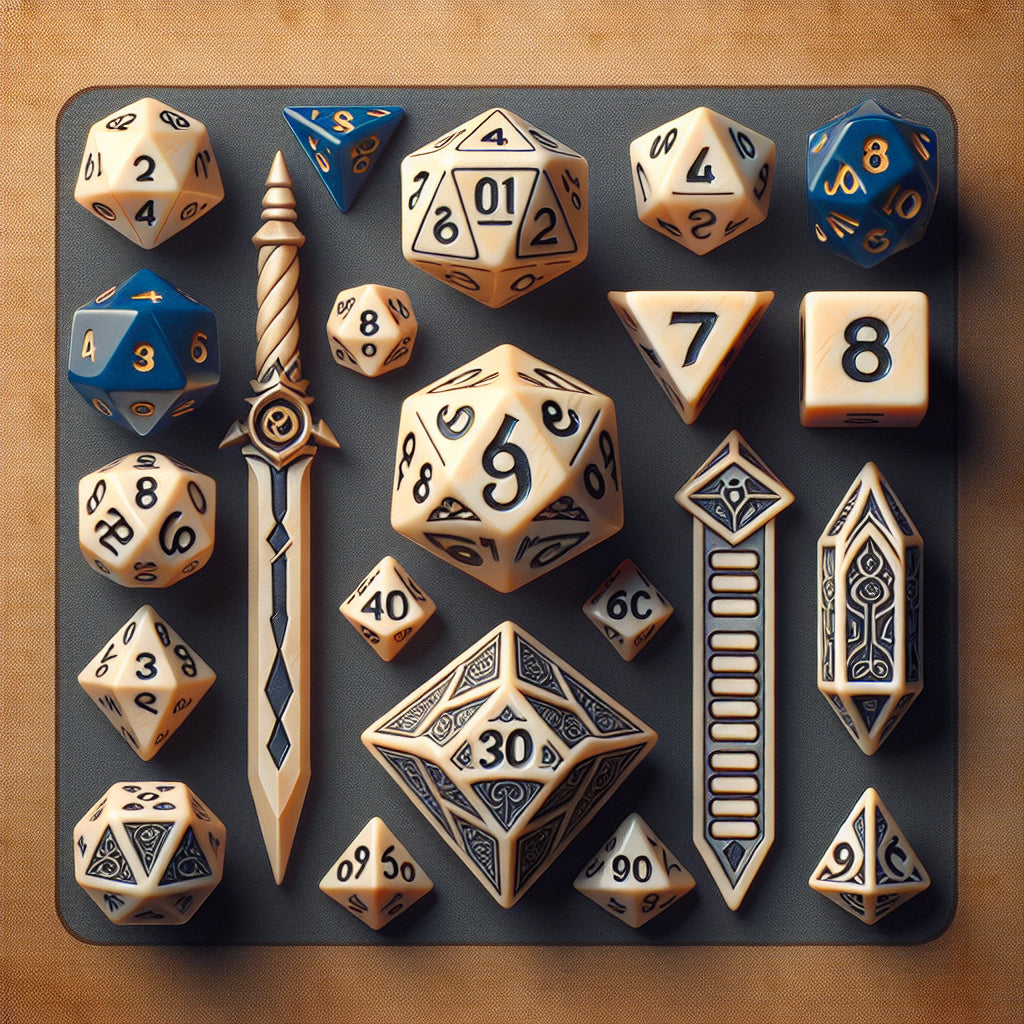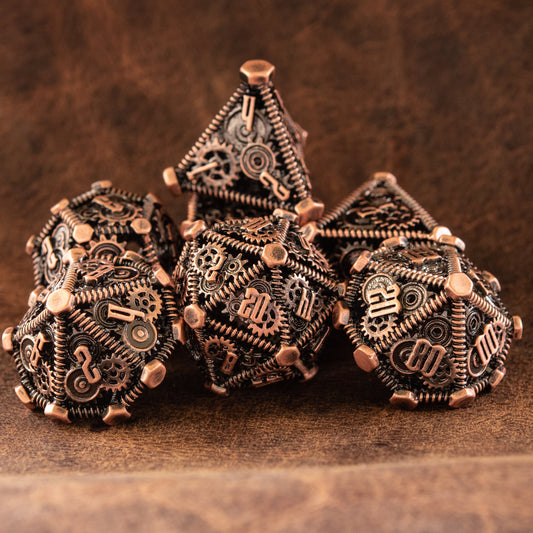How Many DnD Dice Do You Need?
Introduction
Dice are the heartbeat of Dungeons & Dragons (DnD), the crucial tools that determine the outcomes of your character’s actions, the success of your spells, and the fate of your adventures. Understanding how many DnD dice you need and why each type is essential can significantly enhance your gameplay experience. This article delves into the types of dice used in DnD, their roles, and the benefits of having extra dice sets.
Understanding DnD Dice
Definition and Types of Dice
In DnD, a variety of polyhedral dice are used to inject an element of chance into the game. The standard dice set includes:
- d4: Four-sided die
- d6: Six-sided die (commonly seen in many other games)
- d8: Eight-sided die
- d10: Ten-sided die
- d12: Twelve-sided die
- d20: Twenty-sided die
- d100: Percentile die (often represented by two d10s)
The Role of Dice in DnD
Dice in DnD are pivotal in determining the success or failure of actions, from combat attacks to spell casting and skill checks. They add unpredictability and excitement, ensuring that every game session is unique and engaging. The d20, for example, is fundamental in making attack rolls and ability checks, while other dice determine the damage dealt or healed, and the outcomes of various spells and abilities.
Minimum Dice Requirements
Basic 7-Dice Set
At a minimum, every DnD player should have a basic set of seven dice:
- One d4
- One d6
- One d8
- Two d10s (one standard and one percentile)
- One d12
- One d20
Why You Need Each Dice
Each type of dice serves a distinct purpose in gameplay:
- d4: Used for small damage rolls, such as dagger attacks or low-level spells.
- d6: Commonly used for rolling ability scores, weapon damage, and spells like Fireball.
- d8: Often used for weapon damage and some spell effects.
- d10: Utilized for higher damage rolls and for rolling percentages with the percentile die.
- d12: Less frequently used but essential for certain high-damage weapons and abilities.
- d20: The most critical die, used for attack rolls, saving throws, and skill checks.
- d100: Primarily used for percentile rolls, often in determining the success of certain skills or the outcomes of random events.
Additional Dice for Specific Classes
Fighters and Other Classes
Fighters and similar classes might not require as many dice as spellcasters, but having multiple sets can still be beneficial. For instance, a fighter might benefit from extra d6s for weapon damage rolls or additional d20s for attack rolls, particularly when dealing with advantage or disadvantage mechanics.
Spellcasters
Spellcasters, on the other hand, often need a larger variety of dice. For example:
- Sorcerers and Wizards: May need multiple d6s for spells like Fireball, which can require rolling up to 8d6 for damage.
- Warlocks: Often use d10s for spells such as Eldritch Blast.
- Clerics and Druids: Might need multiple d8s for healing spells like Cure Wounds or for damage rolls with spells like Flame Blade.
Benefits of Having Extra Dice
Convenience and Efficiency
Having multiple sets of dice can make gameplay more convenient and efficient. Instead of rerolling the same die multiple times, players can roll all the necessary dice at once, speeding up the game and keeping the momentum going. This is particularly useful during intense combat situations where time is of the essence.
Speeding Up Gameplay
Extra dice sets can significantly reduce downtime during gameplay. For instance, a player casting Fireball can roll all 8d6 simultaneously instead of rolling one die eight times. This not only speeds up the game but also keeps players engaged and focused on the action.
In conclusion, understanding how many DnD dice you need and why each type is essential can greatly enhance your DnD experience. Whether you're a seasoned player or a newcomer, having the right dice and enough of them can make your adventures smoother, more efficient, and ultimately more enjoyable. So, gather your dice, prepare your character sheets, and let the dice roll guide your epic quests in the world of Dungeons & Dragons!
Building Your Dice Collection
Gradually Expanding Your Collection
As you embark on your Dungeons & Dragons journey, starting with a basic set of seven dice is perfectly adequate. However, as you become more immersed in the game, you might find the need to expand your collection. Here are some tips on how to gradually build your dice arsenal:
- Assess Your Needs: Pay attention to the types of rolls your character frequently makes. If you're playing a spellcaster, you might need more d6s and d8s for spell damage. Fighters might benefit from extra d20s for attack rolls.
- Add Dice Sets Over Time: Instead of buying a large quantity of dice all at once, consider purchasing additional sets gradually. This allows you to spread out the cost and build a diverse collection.
- Look for Deals and Bundles: Many retailers offer discounts on bulk purchases or bundles of dice sets. Keep an eye out for these deals to get more value for your money.
- Explore Specialty Dice: As you become more experienced, you might want to experiment with specialty dice like d3s, d30s, or even a d100. These can add a unique flair to your gameplay and help with specific mechanics.
Starting with the Basics
For new players, starting with the basics is key. Here are some tips to get you started on the right foot:
- Invest in a Quality Set: Your first set of dice should be durable and easy to read. Look for dice made from high-quality materials and with clear numbering.
- Choose a Versatile Color: Opt for a color that stands out on your gaming table. This helps prevent mix-ups with other players' dice.
- Get a Dice Bag: A good dice bag will keep your collection organized and prevent your dice from getting lost or damaged.
- Practice Rolling: Spend some time getting familiar with how your dice roll. This can help you feel more confident during gameplay and ensure fair rolls.
Recommended Quantities and Types
Optimal Number of Each Dice
To ensure efficient gameplay, having the right quantities of each type of dice is crucial. Here's a recommended breakdown:
- d4: 4-5 dice (useful for spells like Magic Missile)
- d6: 10-20 dice (essential for many spells and abilities)
- d8: 4-5 dice (common for weapon damage and healing spells)
- d10: 4-5 dice (useful for certain spells and abilities)
- d12: 1-2 dice (less frequently used but important for specific attacks)
- d20: 2-3 dice (critical for attack rolls, saving throws, and skill checks)
- d100: 1 die (or two d10s for percentile rolls)
Specialty Dice
Specialty dice can add an extra layer of excitement and efficiency to your game. Here are a few examples:
- d3: Used for specific abilities or house rules that require a three-sided die.
- d30: Occasionally used in certain campaigns or homebrew rules.
- d100: Adds a tactile thrill to percentile rolls, though two d10s can serve the same purpose.
Maintenance and Care of Dice
Cleaning and Storing Dice
Proper maintenance of your dice ensures they remain in good condition and provide fair rolls. Here are some tips:
- Cleaning: Use mild soap and warm water to clean your dice. Avoid harsh chemicals that could damage the numbering.
- Drying: Ensure your dice are thoroughly dried before storing them to prevent any potential damage.
- Storage: Keep your dice in a clean, enclosed container or a dedicated dice bag. This protects them from dust and damage.
Ensuring Fair Rolls
To maintain the integrity of your game, it's important to ensure your dice roll fairly:
- Inspect for Damage: Regularly check your dice for any chips or wear that could affect their balance.
- Rotate Usage: Use different sets of dice periodically to avoid overusing a single set, which can lead to uneven wear.
- Test Rolls: Occasionally test your dice by rolling them multiple times to ensure they produce a fair distribution of results.
Digital Alternatives
Pros and Cons of Digital Dice
Digital dice apps offer a convenient alternative to physical dice, but they come with their own set of advantages and disadvantages:
Pros:
- Convenience: Easily accessible on smartphones or tablets, perfect for on-the-go gaming.
- Customization: Many apps allow for custom dice skins and sound effects.
- Accuracy: Ensures perfectly random rolls without the risk of physical imperfections.
Cons:
- Lack of Tactile Experience: Some players miss the feel of rolling physical dice.
- Dependence on Technology: Requires a device and power source, which can be a limitation in some settings.
- Potential Distrust: Some players may be skeptical of the randomness of digital rolls.
Using Dice Apps
If you choose to use digital dice, here are some tips to enhance your experience:
- Choose a Reputable App: Look for apps with good reviews and a history of reliable performance.
- Familiarize Yourself: Spend time learning the app's features to make the most of its capabilities.
- Use in Conjunction with Physical Dice: Consider using digital dice for specific rolls while keeping physical dice for others, blending the best of both worlds.
Conclusion
In summary, understanding how many DnD dice you need and why each type is essential can greatly enhance your DnD experience. From starting with a basic set to gradually expanding your collection, having the right dice can make your adventures smoother and more enjoyable. Whether you prefer the tactile feel of physical dice or the convenience of digital alternatives, ensuring you have the right tools for the job is key.
So, gather your dice, prepare your character sheets, and let the dice roll guide your epic quests in the world of Dungeons & Dragons. Happy adventuring!
By following these guidelines, you'll be well-prepared to tackle any challenge that comes your way in the world of Dungeons & Dragons. Remember, the right dice can make all the difference in your gameplay experience, so choose wisely and may your rolls always be in your favor!






